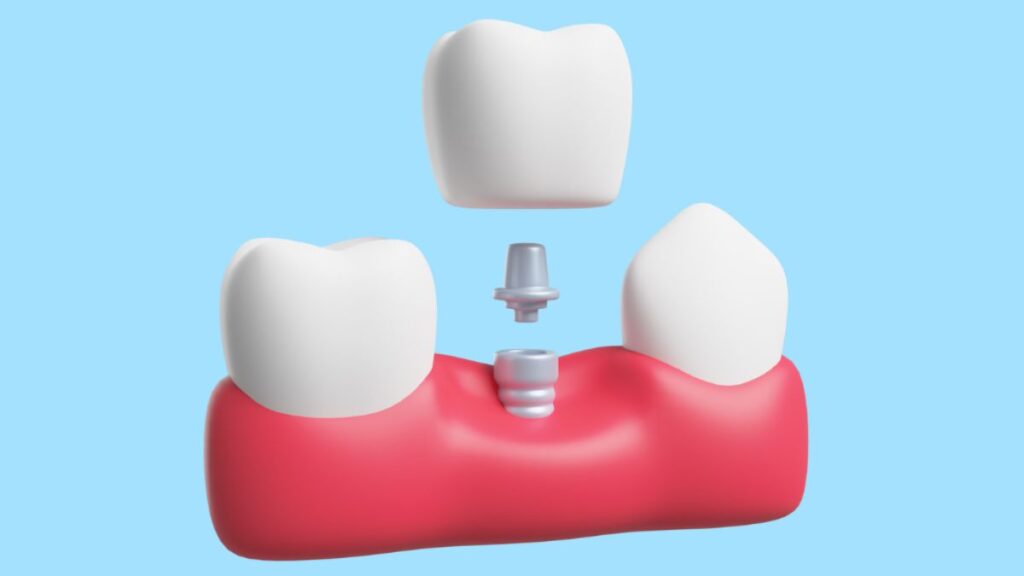What do you do if your favourite book’s cover is torn, but the pages inside are still good? You change the cover to keep the rest of the book safe. Dental crowns work in much the same way. When your teeth are weakened by breaking, cracking, or injury, they cover your teeth and prevent further damage. Damaged and weakened teeth can cause excruciating pain and discomfort. Not only that, damaged teeth also hamper your ability to eat comfortably and speak clearly, and may even look unsightly. However, dental crowns work as a lifesaver in such situations, protecting the teeth from further deterioration. Dental crowns are a proven solution that has helped many Australians restore the functionality and appearance of their smile. If you are considering dental crowns in Canberra, this comprehensive guide will walk you through everything you need to know about this popular restorative procedure.
What Is A Dental Crown?
You can think of crowns as dental caps for teeth. It is a custom-made tooth-shaped covering for the visible portion of the tooth that extends to the gum line to restore its shape, size, strength, and appearance. Unlike dental fillings, crowns give full protection and support, all while feeling and functioning just like natural teeth. The best part is that you won’t be able to tell them apart.
When Would a Dentist Recommend a Dental Crown?
Crowns for teeth are a part of restorative dentistry that are used to improve the function and appearance of teeth. As such, they are recommended when the teeth are damaged or decayed. Here are the primary reasons for your dentist to recommend a dental crown:
- Tooth Decay: Sometimes a cavity is too large to fill. In such cases, a dentist may recommend a crown to restore the tooth’s structure and prevent further decay.
- Cracked or Broken Teeth: For cracked, chipped, or broken teeth, a crown can act as a protective covering that holds the parts together and prevents further damage.
- After Root Canal Treatment: A root canal treatment can leave a tooth feeling more brittle and prone to falling. With a dental crown, you can provide essential protection and strength to such weakened teeth.
- Worn-Down Teeth: Other than injury and trauma, there are other ways in which teeth can get damaged, and years of grinding and clenching are one of them. Having dental caps for teeth can help restore proper height and function.
- Cosmetic Enhancement: Beyond oral health, teeth are also important for aesthetic and visual purposes. Your smile can give you confidence and belief. When you have severely damaged, discoloured, or misshapen teeth, crowns can improve the appearance and restore your smile and confidence.
- Supporting Dental Bridges: When you have missing teeth and you need dental bridges to fill these gaps, dental crowns are usually used to provide strength and support to the bridge. In such procedures, crowns help anchor dental bridges in place.
- Protecting Weak Teeth: Sometimes, teeth get weakened and need strength and support. If a tooth is at risk of breaking due to weakness, a crown can prevent fracture.
How Dental Crowns Protect Your Teeth
Dental crowns go beyond just fixing a damaged tooth. Here’s how they help protect the teeth:
Restore Function:
Damaged or decayed teeth can cause pain and affect the teeth’s functions, like biting, chewing, speaking, etc. With dental crowns, you can again bite, chew, and speak normally without pain or difficulty.
Protection:
When you get crowns for weak teeth, you’re protecting them from further damage and decay. It can help save the teeth from deteriorating to an extent where you might need an extraction. They also act as a shield, protecting the teeth from potential damage by bruxism or acidic erosion.
Durability:
When you get a dental procedure like crowns for teeth, you would usually want to get rid of your troubles for a long time. You won’t want to undergo the same procedure again and again in a few months or years. Dental crowns offer that longevity and durability, as with proper care, they can typically last 10-15 years, and sometimes even longer.
Natural Appearance:
Misshapen teeth affect more than just your teeth’s functions. They can also affect your confidence. Even dental crowns that are visible and differentiable can make you feel conscious and embarrassed. However, modern crowns look just like natural teeth, restoring your smile and boosting your confidence without any embarrassment.
Improved Oral Health:
Another benefit of crowns is their role in improving oral health. Dental crowns cover and protect damaged teeth, thus preventing bacteria from entering cracks and causing infections.
Take the First Step Toward Your Restored Smile
Dental crowns have helped countless Australians enjoy comfortable, functional teeth once again. Whether you’re dealing with a damaged tooth, have completed root canal treatment, or simply want to improve your smile’s appearance, dental caps for teeth offer a reliable, long-lasting solution.
Canberra offers excellent dental care with experienced practitioners using state-of-the-art technology. Local dentists like the Dentist at Dickson stay current with the latest techniques and materials, ensuring you receive high-quality treatment. Don’t let a damaged or unsightly tooth hold you back any longer. With modern dental crowns, you can enjoy a beautiful, healthy smile for years to come.
So if you’re looking for a solution to your dental troubles, stop waiting around. Contact a trusted dental clinic in Canberra to schedule your consultation today.
Frequently Asked Questions
Q1. How long do dental crowns usually last?
A: Most dental crowns last 10–15 years, and with excellent care, they can last even longer. Their lifespan depends on the crown material, oral hygiene, and habits like grinding or clenching.
Q2. Do dental crowns look natural?
A: Yes. Modern dental crowns are designed to match the colour, shape, and size of your natural teeth. Once fitted, they blend seamlessly into your smile.
Q3. Is getting a dental crown painful?
A: The procedure is generally comfortable and pain-free. Dentists use local anaesthesia to ensure you don’t feel discomfort, and any mild sensitivity afterwards usually settles quickly.
Q4. When should I consider getting a dental crown?
A: You might need a dental crown if you have a cracked tooth, a large cavity, worn-down teeth, a weakened tooth after a root canal, or want to improve the appearance of a damaged or misshapen tooth. Your dentist can determine whether a crown is the right choice.
Q5. How do dental crowns protect my teeth?
A: Dental crowns work like a sturdy protective cap, covering the entire visible portion of the tooth. This shields it from further damage, prevents bacteria from entering cracks, restores strength for chewing, and reduces the risk of fractures or further decay.







